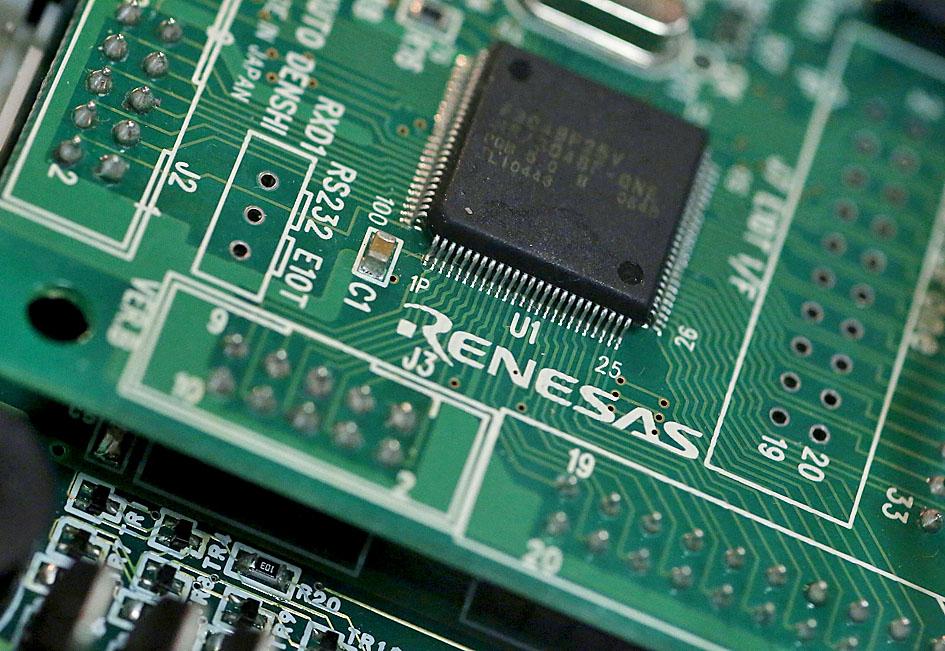Japan has signed off on a ¥37 billion (US$338 million) semiconductor research project to develop cutting-edge chip technology in the country with Taiwan Semiconductor Manufacturing Co (TSMC, 台積電).
Taiwan’s chipmaking plants are among the largest and most advanced in the world, and the project is intended to boost Japan’s competitiveness in a key sector.
The move comes as the industry grapples with a global semiconductor shortage that has hampered the manufacturing of numerous products, particularly vehicles.

Photo: Reuters
About 20 Japanese companies would work with TSMC in the project, with the government paying for more than half of it, a Japanese Ministry of Economy, Trade and Industry official said yesterday.
The research would focus in particular on tech for 3D chip assembly, allowing the creation of components that are denser, but still small.
A surge in demand for home electronics that use semiconductors, fueled by the COVID-19 pandemic, has throttled chip supplies — a crisis deepened by a US cold snap, a drought in Taiwan and a fire at Renesas Electronics Corp in Japan.
Semiconductors are an essential part of modern tech, from smartphones to games consoles and new vehicles, with the auto industry one of the hardest hit by the shortage.
Construction is to begin this summer on research facilities at Japan’s National Institute of Advanced Industrial Science and Technology in Tsukuba, the official said, with the project due to begin next year.
Among the Japanese companies involved are chemical firms Asahi Kasei Corp, Mitsui Chemicals Inc and Sumitomo Chemical Co.

Shares in Taiwan closed at a new high yesterday, the first trading day of the new year, as contract chipmaker Taiwan Semiconductor Manufacturing Co (TSMC, 台積電) continued to break records amid an artificial intelligence (AI) boom, dealers said. The TAIEX closed up 386.21 points, or 1.33 percent, at 29,349.81, with turnover totaling NT$648.844 billion (US$20.65 billion). “Judging from a stronger Taiwan dollar against the US dollar, I think foreign institutional investors returned from the holidays and brought funds into the local market,” Concord Securities Co (康和證券) analyst Kerry Huang (黃志祺) said. “Foreign investors just rebuilt their positions with TSMC as their top target,

REVENUE PERFORMANCE: Cloud and network products, and electronic components saw strong increases, while smart consumer electronics and computing products fell Hon Hai Precision Industry Co (鴻海精密) yesterday posted 26.51 percent quarterly growth in revenue for last quarter to NT$2.6 trillion (US$82.44 billion), the strongest on record for the period and above expectations, but the company forecast a slight revenue dip this quarter due to seasonal factors. On an annual basis, revenue last quarter grew 22.07 percent, the company said. Analysts on average estimated about NT$2.4 trillion increase. Hon Hai, which assembles servers for Nvidia Corp and iPhones for Apple Inc, is expanding its capacity in the US, adding artificial intelligence (AI) server production in Wisconsin and Texas, where it operates established campuses. This

H200 CHIPS: A source said that Nvidia has asked the Taiwanese company to begin production of additional chips and work is expected to start in the second quarter Nvidia Corp is scrambling to meet demand for its H200 artificial intelligence (AI) chips from Chinese technology companies and has approached contract manufacturer Taiwan Semiconductor Manufacturing Co (TSMC, 台積電) to ramp up production, sources said. Chinese technology companies have placed orders for more than 2 million H200 chips for this year, while Nvidia holds just 700,000 units in stock, two of the people said. The exact additional volume Nvidia intends to order from TSMC remains unclear, they said. A third source said that Nvidia has asked TSMC to begin production of the additional chips and work is expected to start in the second

Garment maker Makalot Industrial Co (聚陽) yesterday reported lower-than-expected fourth-quarter revenue of NT$7.93 billion (US$251.44 million), down 9.48 percent from NT$8.76 billion a year earlier. On a quarterly basis, revenue fell 10.83 percent from NT$8.89 billion, company data showed. The figure was also lower than market expectations of NT$8.05 billion, according to data compiled by Yuanta Securities Investment and Consulting Co (元大投顧), which had projected NT$8.22 billion. Makalot’s revenue this quarter would likely increase by a mid-teens percentage as the industry is entering its high season, Yuanta said. Overall, Makalot’s revenue last year totaled NT$34.43 billion, down 3.08 percent from its record NT$35.52